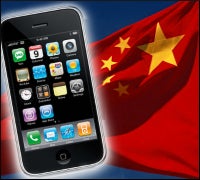 |
With this week’s launch of the iPhone in China, Apple became the latest foreign company to seek a slice of the country’s booming mobile market. But some analysts point to factors endemic in China’s wireless market that are growing too large to ignore — and which could have serious implications for competitors in the space.
Some industry observers had predicted a tepid consumer reaction to the iPhone’s debut in China, where it’s being sold by carrier partner China Unicom. So far, those early expectations might not be far off: China Unicom has sold only 5,000 units so far, Reuters reported.
Analysts partly blame the high cost of the iconic handset, which retails for about $730 to $1,000 without a contract, and because of the fact that it’s been stripped of Wi-Fi to comply with government regulations.
However, they’ve also pointed to another factor playing a huge role in Apple’s (NASDAQ: AAPL) aspirations for China: The country’s vast gray-market mobile phone business, which research firm iSuppli dubbed the nation’s “dirty little secret.”
Gray-market
iSuppli said China’s mobile devices rely on faked International Mobile Equipment Identity numbers — which wireless carriers use to check and see whether a mobile phone is legitimate.
This illicit enterprise is slated for huge growth, iSuppli added: China’s gray market wireless handset shipments are expected to reach 145 million units in 2009, up a stunning 43.6 percent from 101 million in 2008, according to the company’s research.
This will comprise nearly 13 percent of the 1.13 billion unit global market for legitimate cell phones.
“Because of its under-the-table status, China’s gray market has been difficult to size up,” Kevin Wang, director of China research for iSuppli, said in a statement. “However, with its vast size, growing competitive presence and increasing influence on the global supply chain, this market now must be reckoned with.”
Apple’s entry into China is seen as the iPhone maker’s big play at grabbing global market share, as the country has 710 million subscribers. In contrast to the light sales in China, Apple sold approximately 1 million iPhones in Europe within three days of its new model’s launch, back in June.


